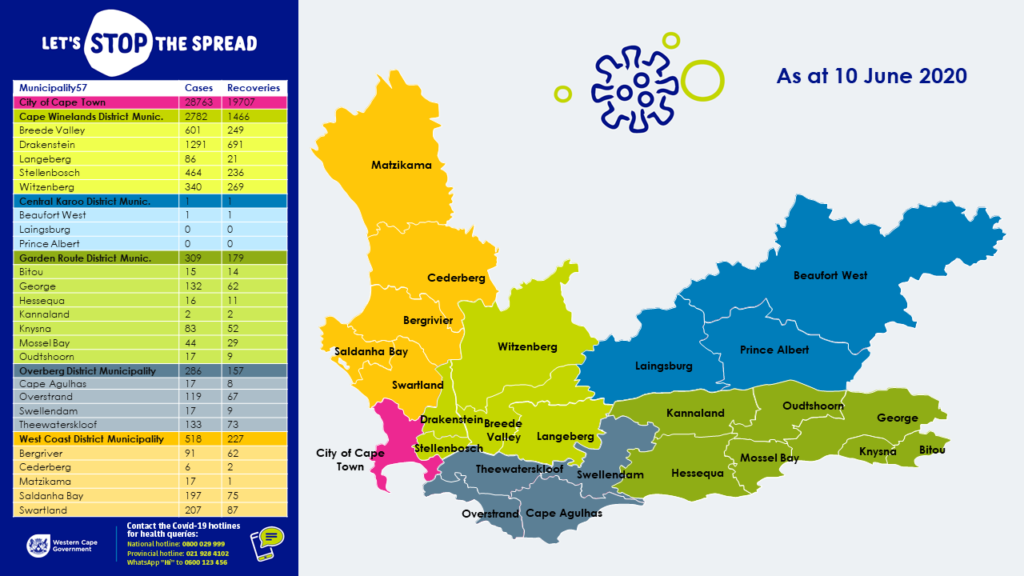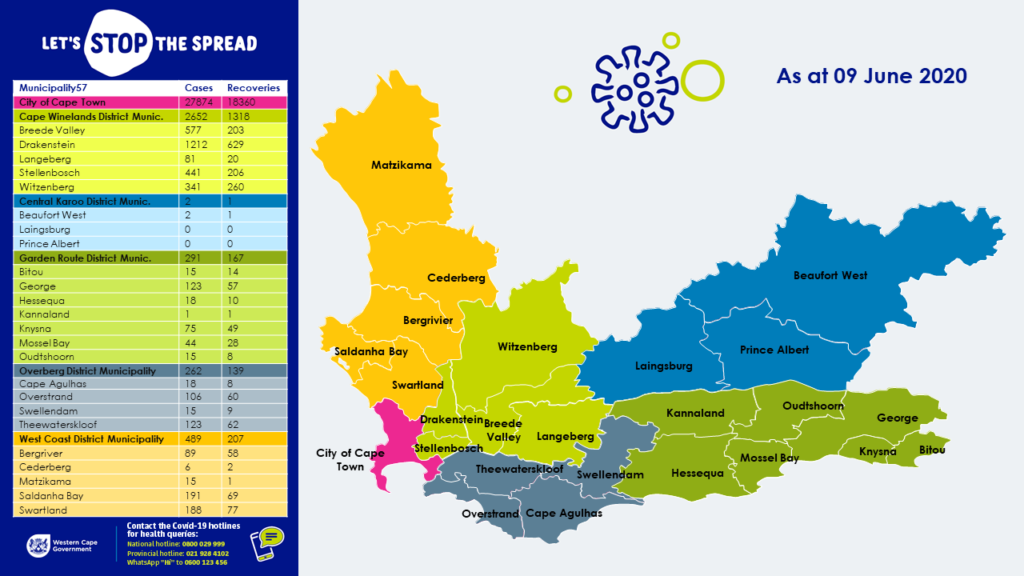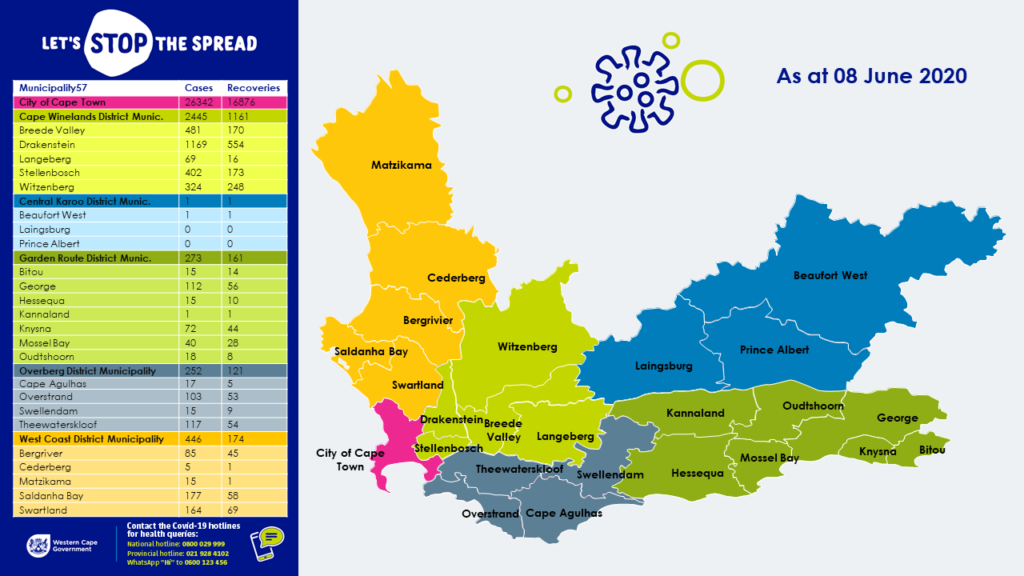
11 June 2020
At today’s weekly digital press conference, I was joined by Provincial Minister of Education, Debbie Schäfer, the Head of Department of Education in the Western Cape, Brian Schreuder, the Head of the Western Cape Department of Health, Dr Keith Cloete, and Chairperson of the South African Paediatric Association, Professor Mignon McCulloch, to provide the public with an update on the safe re-opening of schools in this province.
I fully understand that parents are worried about the Covid-19 pandemic and how the re-opening of schools might impact their child’s well-being. As a parent myself, I know that our number one priority is always the safety of our children.
Medical evidence to support re-opening schools:
That is why as a provincial government, working in cooperation with the National Department of Basic Education, we have followed top medical advice in supporting the decision to re-open schools safely in this province.
The South African Paediatric Association has supported the staggered re-opening schools based on medical evidence:
“Children biologically contain SARS-CoV-2 better than adults, are less likely to get sick if infected, have milder disease, are unlikely to die from Covid-19, and are probably less infectious than adults.”
Professor Mignon McCulloch, who joined the press conference, is the Head of Paediatrics at the Red Cross Children’s Hospital. She also serves on the Executive Council of the International Paediatric Nephology Association and is President of the International Paediatric Transplant Association.
Professor McCulloch added: “Considering that children are at lower risk of acquiring and transmitting SARS-CoV-2, as a group of paediatricians advocating on behalf of our patients, we are of the opinion that the benefits (educational, mental & psychological health, food security and safety) of getting most children back to school exceeds that of keeping them at home. Provided the precautions of face masks, hand-sanitising, environmental cleaning and physical distancing are adhered to, we support the staggered approach of getting children back to school. Where cases of infection do arise, these should be managed on a case by case basis. However, we respect the autonomy of well-informed parents and caregivers to decide what is in the best interests of their children.”
According to data provided by the Western Cape Department of Health, as of 5 June 2020, there had been a total of 1787 cases of Covid-19 in people under the age of 20. This represents roughly 6% of all cases at the time.
The age-groups can be broken down as follows:
Characteristics of COVID-19 cases age <20 years in the Western Cape
5 June 2020; n=1787 |
|
n |
% |
| Age group |
| <5 years |
362 |
20% |
| 5-9 years |
330 |
18% |
| 10-14 years |
408 |
23% |
| 15-19 years |
687 |
38% |
Of these 1787 Covid-19 infections, 5 children unfortunately died. This accounts for 0,3% of all confirmed cases of those infected under the age or 20 and they are often linked to serious comorbidities (underlying health conditions).
Every single death in this province is a death too many, and I extend my sincere condolences to the family and loved ones of these children.
The data, however, does show that children are at a significantly lower risk than adults. In fact, those at highest risk are residents over the age off 55 and those with underlying health conditions such as Diabetes and Hypertension.
Not re-opening schools will hurt our poorest residents the most
There has not been enough discussion about the negative impact on the well-being of our learners of keeping schools closed.
Minister Schäfer said: “Extended school closures do not affect all learners equally, owing to unequal access to home learning support and the internet. Learners in poorer communities are reliant on in-class teaching to receive their education, and the longer schools are closed, the more they are disadvantaged. The gap will only grow between those learners who cannot access education via digital alternatives at home (in our poorer communities in the main), and those who can and do.”
In addition, children who rely on the National School Nutrition Programme lose access to this nutrition during extended school closures. This can negatively impact their health.
Through emergency funding, the Western Cape Department of Education provided over 1,2 million meals during the lockdown period. This will continue to be sustained through the normal school feeding programme now that schools have re-opened again.
Ensuring that schools re-open safely:
The reality is that the virus is going to be around with us for some time, possibly another year at least.
We must adjust to the “new normal” of Covid-19, by making sure that we re-open our schools in a way that reduces the risk and ensures the safety of our learners and staff.
It is for this reason that the Western Cape Education Department has spent R280 million on masks and cleaning materials thus far.
This includes:
- 2.4 million masks (2 per learner and staff member)
- Over 7 000 non-contact digital thermometers
- Millions of litres of hand sanitiser, liquid soap, disinfectant and bleach
The Department has also adopted clear guidelines for the management of cases at schools.
Minister Schäfer said: “Whenever a staff member or learner who has been present at a school is confirmed as positive for Covid-19, the affected areas at the school will be decontaminated. Learners and staff members will not be present when the affected areas are decontaminated. The school will re-open once the certificate of decontamination is received from the service provider.”
In terms of these guidelines:
- Those who have been in close contact (e.g. handshake or hug) with a confirmed positive case (whether at school or outside school) are required to self-isolate for 14 days from their last contact with the individual.
- Those not in close contact do not have to self-isolate. Those who are casual contacts must however be monitored for symptoms.
- If there has been a confirmed case of Covid-19 then the school is required to contact the district for assistance in terms of decontamination.
- The need to close a class, part of school, or school will be assessed on a case by case basis, in line with Dept of Health Guidelines.
- The decision to close a school is only taken by the HOD, and parents and staff will always be informed of cases in a school.
Working with learners to ensure a safe re-opening
In addition to masks, and good hygiene, every single person entering a school in the Western Cape will be screened. A dedicated screening app has been produced for this purpose.
Furthermore, learners and staff will undertake an orientation programme, which includes:
- Why and how to wear a mask
- Important hygiene procedures
- The screening process
- New classroom etiquette and behaviour
- New physical distancing measures
- Important contact information
- How to identify symptoms of Covid-19
- What to do when someone has Covid-19
Those learners that have comorbidities will be supported by the department for home-schooling, and parents will be required to collect the material from their schools.
The Department will make public more information on home-schooling once national directives are announced this week.
We also want to appeal to the public for their understanding and co-operation in ensuring that no external people go onto school premises, unless absolutely necessary. The virus spreads through people, so the more we can limit additional people on school premises, the better.
Following the golden rules
To all our teachers, support and admin staff, and parents: I thank you so much for everything you are doing to ensure our learners get the best education possible during this challenging time. You are all heroes.
Your courage is needed for our young residents, who will look to you during this uncertain time for strength and guidance.
I also remind you that the most important thing we can all do during this pandemic is to follow the golden rules, which include:
- Keep your hands clean, washing them regularly with soap and water (or to use hand-sanitiser)
- Keep your distance from other people (at least 1.5 metres)
- Sneeze into a tissue or the corner of your arm
- Wear a clean cloth mask properly
- Stay home if you are sick, and first call the hotline for advice on what to do next (021 928 4102)










